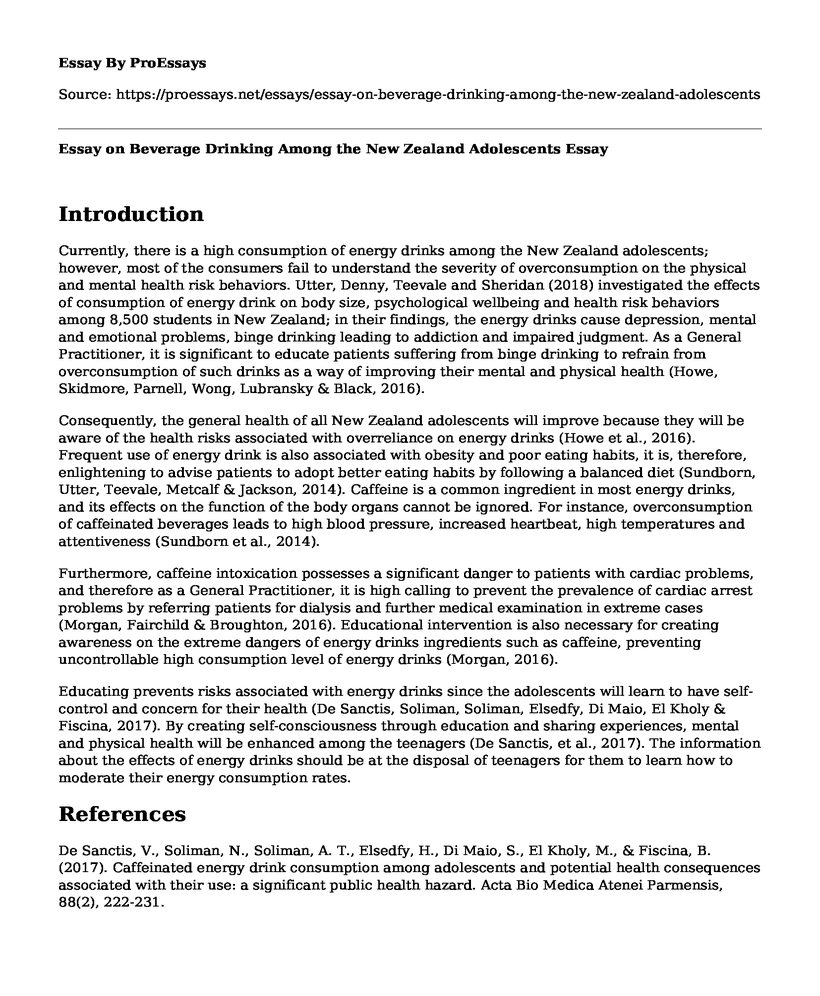Introduction
Currently, there is a high consumption of energy drinks among the New Zealand adolescents; however, most of the consumers fail to understand the severity of overconsumption on the physical and mental health risk behaviors. Utter, Denny, Teevale and Sheridan (2018) investigated the effects of consumption of energy drink on body size, psychological wellbeing and health risk behaviors among 8,500 students in New Zealand; in their findings, the energy drinks cause depression, mental and emotional problems, binge drinking leading to addiction and impaired judgment. As a General Practitioner, it is significant to educate patients suffering from binge drinking to refrain from overconsumption of such drinks as a way of improving their mental and physical health (Howe, Skidmore, Parnell, Wong, Lubransky & Black, 2016).
Consequently, the general health of all New Zealand adolescents will improve because they will be aware of the health risks associated with overreliance on energy drinks (Howe et al., 2016). Frequent use of energy drink is also associated with obesity and poor eating habits, it is, therefore, enlightening to advise patients to adopt better eating habits by following a balanced diet (Sundborn, Utter, Teevale, Metcalf & Jackson, 2014). Caffeine is a common ingredient in most energy drinks, and its effects on the function of the body organs cannot be ignored. For instance, overconsumption of caffeinated beverages leads to high blood pressure, increased heartbeat, high temperatures and attentiveness (Sundborn et al., 2014).
Furthermore, caffeine intoxication possesses a significant danger to patients with cardiac problems, and therefore as a General Practitioner, it is high calling to prevent the prevalence of cardiac arrest problems by referring patients for dialysis and further medical examination in extreme cases (Morgan, Fairchild & Broughton, 2016). Educational intervention is also necessary for creating awareness on the extreme dangers of energy drinks ingredients such as caffeine, preventing uncontrollable high consumption level of energy drinks (Morgan, 2016).
Educating prevents risks associated with energy drinks since the adolescents will learn to have self-control and concern for their health (De Sanctis, Soliman, Soliman, Elsedfy, Di Maio, El Kholy & Fiscina, 2017). By creating self-consciousness through education and sharing experiences, mental and physical health will be enhanced among the teenagers (De Sanctis, et al., 2017). The information about the effects of energy drinks should be at the disposal of teenagers for them to learn how to moderate their energy consumption rates.
References
De Sanctis, V., Soliman, N., Soliman, A. T., Elsedfy, H., Di Maio, S., El Kholy, M., & Fiscina, B. (2017). Caffeinated energy drink consumption among adolescents and potential health consequences associated with their use: a significant public health hazard. Acta Bio Medica Atenei Parmensis, 88(2), 222-231.
Howe, A. S., Skidmore, P. M., Parnell, W. R., Wong, J. E., Lubransky, A. C., & Black, K. E. (2016). Cardiorespiratory fitness is positively associated with a healthy dietary pattern in New Zealand adolescents. Public health nutrition, 19(7), 1279-1287.Morgan, M. Z., Fairchild, R., & Broughton, D. J. (2016). A survey of sports drinks consumption amongst adolescents. British Dental Journal, 220, 639-643.
Sundborn, G., Utter, J., Teevale, T., Metcalf, P., & Jackson, R. (2014). Carbonated beverages consumption among New Zealand youth and associations with BMI and waist circumference. Pac Health Dialog, 20(1), 81-86.
Utter, J., Denny, S., Teevale, T., & Sheridan, J. (2018). Energy drink consumption among New Zealand adolescents: Associations with mental health, health risk behaviours and body size. Journal of paediatrics and child health, 54(3), 279-283.
Cite this page
Essay on Beverage Drinking Among the New Zealand Adolescents. (2022, Jul 25). Retrieved from https://proessays.net/essays/essay-on-beverage-drinking-among-the-new-zealand-adolescents
If you are the original author of this essay and no longer wish to have it published on the ProEssays website, please click below to request its removal:
- Qualitative Research in Nursing Discussion Board
- Essay on Yoga for Overall Good Health
- Acute Renal Injury and Chronic Kidney Disease Essay
- Nursing Care Philosophy Essay Example
- Research Paper on Juvenile Myasthenia Gravis (JMG): Causes, Symptoms & Treatment
- Essay Example on Potassium Intake for Adults: DRI vs US Average
- Essay Sample on Global Pandemic: Effects on Learning, Transport, Business, & Entertainment







